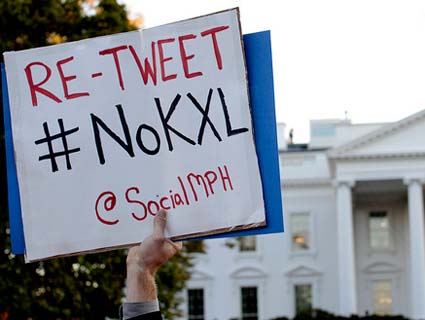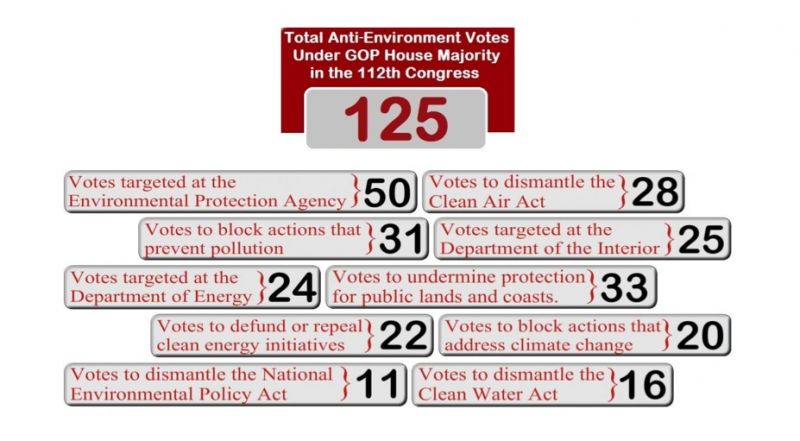
<a href="http://www.flickr.com/photos/simplerich/2136343274/">simplerich</a>/Flickr
UPDATE: Since I first wrote this piece, numbers 2, 4, and 5 on the list have been excised from the Interior Appropriations bill, along with riders that would have prohibited the EPA from regulating water pollution on logging roads and circumvented review of grazing permit. However, a few important riders remain, including one that would block new lightbulb efficiency standards and another that would fast-track oil drilling in Alaska.
On the other hand, Republicans have dug in their heels with regards to Keystone XL (#1), with House Speaker John Boehner insisting that it will remain in the final version of the payroll tax bill. (In fact, Republicans now seem to be trying to make Keystone into a campaign issue.) The rider that would undermine boiler regulations (#3) is still in the House version of the bill, but not the Senate’s, which was passed Saturday—this one probably won’t make it into law.
ORIGINAL POST: It’s no secret that many Republicans aren’t big fans of the EPA. But that hasn’t stopped the GOP from being secretive about what exactly they’re planning to do to scrap environmental regulations. Instead of putting anti-environment policies up for debate as stand-alone bills, they’re trying to bypass scrutiny by sticking them into other pieces of legislation—like appropriations bills—that have to pass to keep key services or pet programs running. These provisions, called riders, are usually hard to find and often even harder to understand; that’s basically the point. Fortunately, the Natural Resources Defense Council has been keeping track of the long list of policies that have been introduced into 2012 appropriations legislation thus far. We’ve put together an abbreviated guide to the most egregious attacks on environmental regulation that Republicans are trying to sneak through Congress by the end of the fiscal year.
-
Rushing a decision on the Keystone XL pipeline: This one’s been getting a lot of attention from environmental groups like the NRDC and the mainstream media alike, and for good reason: Representative Lee Terry’s (R-Neb.) proposal to attach the Keystone decision to the bill to extend the payroll tax holiday would take decision-making power away from the State Department and give it to the Federal Energy Regulatory Commission (FERC)—never mind that FERC doesn’t have experience evaluating pipeline safety. Even worse, FERC would have to make a decision within 30 days of receiving an application, making a real review of the pipeline’s potential impacts basically impossible.
-
Greenwashing coal ash: You might be surprised to learn that coal ash isn’t already classified as a hazardous waste—something that the Obama administration’s been considering changing after a major coal ash spill two years ago in Tennessee. A rider in the 2012 Interior-Environment Appropriations bill, though, would shut down the evaluation process itself by prohibiting the EPA from classifying waste produced by any fossil fuel combustion as hazardous—a proposal supported by industry groups and representatives of coal-producing states that claim a hazardous designation would prevent them from recycling the ash into products like concrete.
-
Delaying clean air: Another rider Republicans are proposing to attach to the payroll tax bill would delay the implementation of new EPA standards for the highest-emitting commercial and industrial boilers and waste incinerators, which spew mercury, lead, dioxin, and other nasty toxins into the air—even though the EPA estimates (PDF) the updated standards would prevent 8,100 deaths each year. Similarly, a rider in the Interior appropriations bill would scrap recently updated standards for cement kiln emissions, which also include toxins like mercury and fine particulate matter.
-
Slowing action on climate change: Section 431 of the Interior appopriations bill is aimed at undermining the EPA’s ability to regulate greenhouse gas emissions, and would basically force the EPA to twiddle its thumbs for at least another year by barring it from issuing or implementing any carbon regulations. Republicans are framing this as a temporary measure while the economy recovers, in keeping with their insistence that government regulation kills jobs (even though evidence shows that regulations have a negligible effect on jobs and might even create them). But the GOP has allied with industry in opposing regulation of carbon emissions from the start, and environmental groups are concerned that Republicans’ real goal is to delay regulation until they have enough power to kill it altogether. And in any case, it’s clear that there’s no time to waste when it comes to climate change.
-
Killing clean cars: Back in July, the White House hashed out a deal with top American automakers to nearly double average fuel economy (to an ambitious 54.5 mpg) by 2025. But Section 453 of the Interior bill would basically bar the government from helping automakers meet that goal or otherwise doing anything to encourage fuel efficiency. Why block a deal that’s already been worked out? Again, it’s part of the overall message that regulations kill jobs. As Think Progress pointed out, Mitt Romney recently said he thinks the EPA should back off from regulating vehicle emissions, and that the agency is being used to “hold down and crush” the private sector.
These are just a few of dozens of the anti-environmental provisions Republicans are looking to push through quickly and quietly. Sure, most of them won’t get through the Democrat-controlled Senate, and President Obama has clearly stated that he will reject any attempts to attach “extraneous issues” to legislation. Still, it’s not impossible to imagine that even staunch environmental defenders would let the occasional provision slide to make a deal—like when Nancy Pelosi caved on the anti-choice Stupak amendment to the health care reform bill in order to get it through the House. But the real reason to pay attention to these riders is that they provide clues as to what Republicans might try to do if they had enough power. Turns out it’s some scary stuff.
















